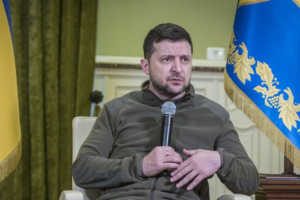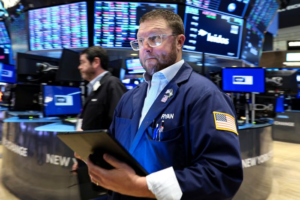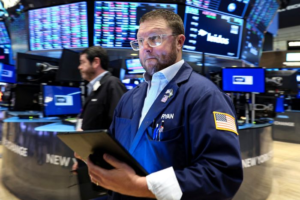

WASHINGTON—Former President
adviser
Steve Bannon
said he wouldn’t cooperate with the House Select Committee investigating the Jan. 6 assault on the U.S. Capitol, while President
Biden
rejected Mr. Trump’s attempt to assert executive privilege over records related to the attack.
Deeming the riot by Trump supporters while Congress was certifying Mr. Biden’s victory “a dark day in democracy,” White House press secretary
Jen Psaki
said Mr. Biden believes in the importance of providing Congress and the public a complete understanding of the events “to prevent them from happening again.”
The order applies to a first batch of records, she said, and others would be reviewed on a case-by-case basis. The committee has requested documents from several executive branch agencies, and neither the panel nor the White House has said what was included in that first batch of records. Still, the move could provide congressional investigators with vital information as it seeks to understand any role the former president and his team played.
Mr. Trump has said he would assert executive privilege to block Mr. Bannon and other former aides from testifying before investigators. In a statement Friday, Mr. Trump decried the investigation and said “this dangerous assault on our Constitution and important legal precedent will not work.”
It wasn’t known Friday afternoon the extent to which two other members of the former president’s inner circle have responded to subpoenas demanding documents and testimony.
Mr. Bannon’s defiance likely will push the issue into the courts, as his lawyer cited Mr. Trump’s assertion of executive and attorney-client privilege as the reason for Mr. Bannon’s inability to respond to the subpoena.
“We will comply with the directions of the courts, when and if they rule on these claims of both executive and attorney-client privileges,” said the lawyer,
Robert J. Costello,
in a letter. “Since these privileges belong to President Trump and not to Mr. Bannon, until these issues are resolved, Mr. Bannon is legally unable to comply with your subpoena requests for documents and testimony.”
The committee, led by Chairman
Bennie G. Thompson
(D., Miss.) and Vice Chair
Liz Cheney
(R., Wyo.) issued subpoenas to four Trump administration officials last month, seeking to compel them to turn over records and sit for depositions in connection with the events surrounding the attack.
In addition to Mr. Bannon, the subpoenas also were sent to former White House chief of staff
Mark Meadows
;
Dan Scavino,
former White House deputy chief of staff; and
Kashyap Patel,
who was chief of staff to the acting Defense secretary at the end of the Trump administration. Mr. Thompson told reporters late last month that Mr. Scavino hadn’t accepted service. The deadline for the four men to produce documents to the committee was Thursday.

The intention by former President Donald Trump adviser Steve Bannon (seen in 2020 outside a courthouse on another matter) to not cooperate with a House committee investigating the Jan. 6 assault on the U.S. Capitol likely will push the issue into the courts.
Photo:
andrew kelly/Reuters
Mr. Meadows declined to comment. Messrs. Patel and Scavino didn’t respond to requests for comment.
Mr. Thompson and Ms. Cheney said in a statement on Friday that Mr. Meadows and Mr. Patel are “so far, engaging with the Select Committee.”
They accused Mr. Bannon of trying “to hide behind vague references to privileges of the former president” and stressed that the committee fully expects all witnesses to comply with the subpoenas, or face criminal contempt of Congress charges.
“Though the Select Committee welcomes good-faith engagement with witnesses seeking to cooperate with our investigation, we will not allow any witness to defy a lawful subpoena or attempt to run out the clock, and we will swiftly consider advancing a criminal contempt of Congress referral” to the Justice Department, Mr. Thompson and Ms. Cheney said.
The select committee was established by House lawmakers in June in a 222-190 vote, almost entirely along party lines. It is tasked with investigating the circumstances of the Jan. 6 riot, when Trump supporters overran the Capitol, temporarily interrupting a joint session of Congress convened to ratify Mr. Biden’s Electoral College victory.
The House impeached Mr. Trump in January for inciting insurrection against the government. The Senate acquitted him, falling 10 votes short of the 67 needed for conviction.
Executive privilege—or the longstanding legal doctrine that the president is entitled to shield some material from public or congressional scrutiny for the purposes of receiving candid advice—dates back to the George Washington administration. But the idea of outside advisers such as Mr. Bannon being potentially covered never came up until the Trump years and no court has definitively weighed in on the question.
“The core idea of executive privilege, if you go back to Washington, is that releasing the information would harm the public interest. It’s a privilege that’s asserted on behalf of the country. The nature of the privilege shows that it’s not something personal that goes with an individual—it goes with the office of the president,” said
Jonathan Shaub,
a law professor at the University of Kentucky.
During Mr. Trump’s time in office, former campaign manager
Corey Lewandowski
—who never served in the administration—claimed executive privilege during a hearing before Congress to avoid discussing some of his conversations with the president. In another instance, a Trump-allied lawyer named
Sidney Powell
tried to invoke the privilege to avoid discussing her conversations with the president during a federal court hearing last year before relenting under pressure from the presiding judge.
But in neither case was a formal legal opinion ever offered on whether a nongovernment employee could make such claims.
The Biden administration’s decision to waive privilege on the documents held by the National Archives could also plunge the committee’s work into a legal battle. While courts have generally held that the privilege is primarily asserted by the current holder of the presidency, the Supreme Court said in a case involving the Nixon administration that a former president could have some say.
If Mr. Trump were to press his claims over the objections of Mr. Biden and found some sympathy in the court system, it could spark years of litigation over the records held by the archives—unless courts were willing to act quickly given the gravity of the committee’s work.
Write to Lindsay Wise at lindsay.wise@wsj.com and Alex Leary at alex.leary@wsj.com
Copyright ©2021 Dow Jones & Company, Inc. All Rights Reserved. 87990cbe856818d5eddac44c7b1cdeb8
















